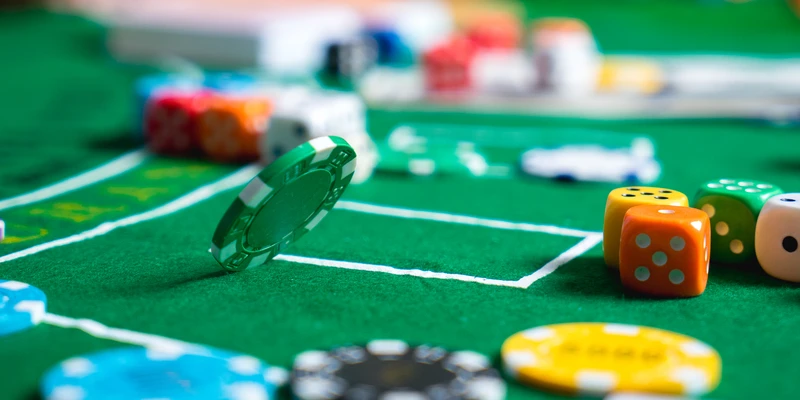Many people enjoy gambling casually, whether it’s buying scratch cards, playing the lottery, or visiting casinos. However, when gambling begins to cause significant distress or impairment, it may be time to consider addiction treatment for gambling disorder.
Let’s explore the signs of gambling addiction, available treatment options, and strategies to help you or your loved one regain control.

Gambling Addiction Treatment Options
Gambling addiction can have serious consequences, but recovery is possible with the right support. Effective treatment programmes are available to help you overcome compulsive gambling:
Evidence-based Therapies
Cognitive Behavioural Therapy (CBT) is an effective therapeutic approach for gambling addiction that helps in recognising and changing unhealthy thoughts and habits. Therapists guide in managing triggers and urges by teaching healthy ways to cope with stress without turning to gambling.
In a review of 5,389 participants across 56 studies, CBT led to significant reductions in gambling disorder severity, frequency, and intensity. About 65%–82% of participants showed greater improvements compared to those receiving minimal or no treatment. The findings suggest that it is an effective approach for reducing gambling harm and behaviours.
Motivational interviewing can also strengthen your commitment to recovery by encouraging goal-setting and building confidence. Group therapy can also be helpful by connecting you with people facing similar struggles, reducing feelings of isolation, and providing valuable peer support.
Pharmacological Intervention
Medications can help in addiction recovery, especially if you have co-occurring mental health conditions like depression. Antidepressants may help ease low mood or obsessive thoughts that lead to gambling, while mood stabilisers can manage mood swings that affect gambling behaviour.
Drugs like naltrexone, used for substance addictions, may reduce gambling urges by targeting the brain’s reward system. Some evidence suggests it reduces cravings by modulating opioid receptors, though it’s not FDA-approved specifically for a gambling disorder.
These medications should only be used under medical supervision and work best when combined with therapy, not as a standalone treatment.
Inpatient and Outpatient Programmes
If gambling is profoundly affecting your life, structured professional treatment may be necessary. Outpatient treatment allows you to live at home while attending individual and group sessions. For severe gambling cases, inpatient or residential rehab provides intensive care in a safe, controlled environment. This level of care can also remove gambling triggers and encourage positive change.

Effective Strategies to Stop Compulsive Gambling
Overcoming compulsive gambling requires a combination of strong support, effective therapy, and practical relapse prevention skills. Drawing on both professional help and peer support can empower you to manage urges and sustain long-term recovery.
Seeking Professional Help
Gambling addiction is a complex condition that often requires expert guidance to address its underlying causes and develop effective coping strategies. Addiction specialists can provide effective individual therapy and treatment plans, increasing your chances of achieving lasting recovery.
Involving Loved Ones
Involving loved ones in your journey can be helpful, as addiction often damages trust and strains relationships. Family therapy helps rebuild trust and improve communication, allowing loved ones to support recovery without enabling addictive behaviour.
Joining Support Groups
Joining support groups, such as Gamblers Anonymous, can help you connect with others facing similar challenges and reduce feelings of isolation. These groups follow a 12-step approach that provides structure, emotional support, and the opportunity to share experiences and gain insight from others.
Relapse Prevention Planning
A strong relapse prevention plan may include strategies like avoiding triggers and high-risk situations, as well as using apps to restrict access to gambling sites. Many people also continue with regular counselling even after they’ve stopped gambling to reduce the risk of relapse.
Addressing Challenges in Problem Gambling
The rise of digital platforms has transformed gambling, creating new challenges for those struggling to recover from addiction. Online gambling platforms are now easily accessible, which reinforces the endless cycle of gambling, especially among young people and vulnerable individuals.
Technology also influences gambling habits through targeted advertisements and game rewards that encourage frequent play. The convenience of digital payments and fast-paced games further fuels addiction, making it harder to resist the urge and easier to spend more time and money than intended.
Despite the growing need for help, accessing addiction treatment for gambling disorder remains difficult due to limited local services and a lack of awareness about where to find support. Feelings of shame and fear of judgment often prevent many individuals from seeking the help they need.

Understanding Addiction Treatment for Gambling Disorder
Gambling addiction, also known as compulsive gambling or gambling disorder, is a mental health condition classified as a behavioural addiction. It is characterised by repeated, uncontrollable urges to gamble, even when it causes significant distress or disruption to daily life.
While anyone can develop a gambling addiction, certain factors increase vulnerability. These include genetics, a family history of addiction, underlying mental health conditions, and environmental influences. High impulsivity, exposure to stressful life events, and easy access to gambling also raise the risk.
Signs and Symptoms of Gambling Addiction
Gambling may seem like a harmless pastime at first, but it can quickly become a serious issue if left unchecked. Key signs to look out for include:
- Frequent thoughts about gambling.
- Increasing urges to gamble more frequently or place larger bets.
- Chasing losses by betting more in an attempt to recover lost money.
- Neglecting responsibilities due to time or money spent on gambling.
- Gambling to escape problems, stress, or negative emotions.
- Being secretive, defensive, or lying about gambling habits.
- Irritability, restlessness, or anxiety when unable to gamble.
- Repeated unsuccessful attempts to cut down or stop gambling.
- Borrowing money or selling possessions to finance gambling activities.
- Losing important relationships, jobs, or opportunities due to gambling behaviour.
If you or someone you care about is experiencing these symptoms, it’s important to seek help immediately. Early recognition and treatment can prevent further harm caused by gambling addiction.

Effects of Gambling Addiction
Gambling addiction can have a serious impact on mental health, often causing anxiety, depression, substance abuse, and feelings of guilt, shame, and hopelessness. It can also damage relationships by breaking trust and causing frequent arguments over money and time spent gambling.
Financial problems are common, with mounting debts affecting daily living and housing stability. Some people may even turn to illegal activities like theft or fraud to obtain money for gambling. The combined outcomes of mental, emotional, and financial problems can severely reduce overall quality of life.
Gambling Rehab at Sierra Recovery
Gambling can escalate into addiction as quickly as it can harm your health, finances, and relationships. It may all feel overwhelming now, but healing is within reach. At Sierra Recovery, we help individuals overcome gambling addiction with a combination of addiction treatment and mental health support. Reach out today and let us guide you on a clearer path to recovery.
Frequently Asked Questions
What are the most effective forms of therapy for combating gambling addiction?
CBT, motivational interviewing, and group therapy are the most effective treatments for gambling addiction. Involving family members can also strengthen support at home.
Can medication play a role in the treatment of gambling disorder?
Medication can help in treating gambling addiction, especially if there are other mental health issues, like depression or anxiety. Antidepressants and mood stabilisers may reduce gambling urges, but are usually prescribed alongside therapy.
How does cognitive behavioural therapy assist individuals with gambling problems?
It helps in recognising triggers and replacing harmful gambling thoughts with healthier and more constructive thinking. It is a widely used, effective approach for different types of addiction.
What support systems are recommended for someone struggling with gambling addiction?
Support groups, such as Gamblers Anonymous, and NHS treatment services can be helpful in your recovery journey. Through emotional support, family and friends can also play a key role.
What is the typical duration of treatment for someone with a gambling disorder?
Treatment can last from a few months to over a year, depending on the person's progress and circumstances. Ongoing support after therapy helps prevent relapse and builds a strong foundation for long-term healing.
Are there any new and promising treatments for gambling addiction being researched?
Yes, digital therapy, smartphone tools, and personalised treatments are being developed to keep up with evolving needs. These aim to provide real-time support and improve treatment outcomes.






